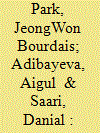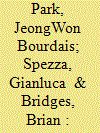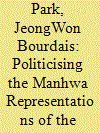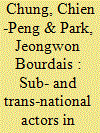|
|
|
Sort Order |
|
|
|
Items / Page
|
|
|
|
|
|
|
| Srl | Item |
| 1 |
ID:
180681


|
|
|
|
|
| Summary/Abstract |
This paper enquires into how effectively “regional transboundary water governance” functions in resolving ecological problems associated with shared water resources. It compares three cases in Asia—the Irtysh River, Aral Sea, and Mekong River basin. Previous scholarly work on the hydro-politics of these three cases within social science disciplines, especially political science and international relations, focuses heavily on the dimension of “hegemonic power disparity between state actors” (from the weaker parties’ points of view) and/or the “economic or strategic benefits of development either defending or criticizing” (from the more powerful—often the polluters’—point of view). To contribute to existing research, this paper intends to enlarge the analytical scope and use the formation of regional environmental governance to grasp a broader picture of the complexity and interconnectivity of ecological issues, regional history, and politics. For analysis, we investigated the multilevel gaps in environmental communication at three different levels, exploring both the conflictual and cooperative relationships amongst all actors involved, namely (a) state-to-state relations: hydro-hegemonism due to the power disparity in historical and political contexts; (b) society level: authoritarian environmentalism between politics and citizens; and (c) global inter-connectivity or distance from (or the absence of) the application of international norms. We argue that all three cases, albeit at various degrees, equally exhibit the potential to fill the multidimensional gaps to ensure more functional, effective, and equitable regional hydro-governance.
|
|
|
|
|
|
|
|
|
|
|
|
|
|
|
|
| 2 |
ID:
194896


|
|
|
|
|
| Summary/Abstract |
In light of China’s rapid growth and increasing engagement in the global climate regime, the authoritarian regulatory model has attracted attention from researchers and policymakers alike. This paper examines the question of to what extent and in what way state authoritarianism leads to (un)successful environmental policy implementation in China, with particular attention to energy transformation. This study inter-connects macro and micro inquiries through a case study of nuclear energy policy in China. An examination of the extended policy cycle as a comprehensive process that brings a policy to fruition shows that authoritarian regulatory environmental policy intervenes in each stage, resulting in a particular path of the evolution of environmental policy in nuclearising energy transformation in China. Adding to commonly accepted tenets of authoritarian environmentalism in general, the explanations of Chinese distinctiveness in materialising environmental policy enhances the understanding of the merits and challenges of authoritarian mechanisms of environmental policy.
|
|
|
|
|
|
|
|
|
|
|
|
|
|
|
|
| 3 |
ID:
186806


|
|
|
|
|
| Summary/Abstract |
The article examines the European Union (EU)'s policy toward and interactions with North Korea (DPRK) in order to answer the question, "To what extent, despite prima facie ruptures in the relationship, has the EU been engaged with the DPRK, which is conventionally understood as an unreliable state." Although the EU is seemingly inactive in North Korean affairs, yet it is a powerful institution that can play a significant role in the peacemaking process in Asia including on the Korean peninsula. This article explores, firstly, how the EU's policy toward Asia has evolved historically; secondly, how far such an agenda and principles have been implemented in the North Korean context; and finally, the extent to which previous practices pave the way for the two parties to be included in the process of forming a kind of extended regional governance in future. A common view is that the EU's strategical/political motivation for getting involved in North Korean affairs is negligible due to a lack of economic interests to counterbalance high political risks. This article highlights that, contrary to the common understanding of its soft issue-focused approach to Asia, the EU has been persistently engaged in DPRK affairs, notwithstanding the significant structural barriers. This role underpins the EU's growing intention and potential to enhance interactions under the aegis of comprehensive security (third generation cooperation) covering the economic, social, cultural, and human security-focused aspects of the relationship.
|
|
|
|
|
|
|
|
|
|
|
|
|
|
|
|
| 4 |
ID:
175867


|
|
|
|
|
| Summary/Abstract |
Article Type: Research Paper Purpose— This article examines the mechanism of major IGOs' (inter-governmental environmental organizations) assistance and cooperation for the purpose of improving ecological conditions in North Korea (DRPK: Democratic People's Republic of Korea). Design, Methodology, Approach— This research delves into how certain IGOs have cooperated with North Korea in select environmental fields. It particularly investigates the relevant activities of prominent organizations that have been engaged in North Korea's environment-related issues. Findings— Contrary to the views of neo-functional green détentes or the hopeful outlooks of ecologists, and at odds with the general expectation for neutrality from IGOs, this article argues that immediate and prioritized material interests of North Korea as well as IGOs' financial constraints cause only intermittent attention, and yet the consequences of such temporality and discontinuity resulted in some positive ecological initiatives. However, they have also largely marginalized sustained environmental management in the country. Practical Implications— Inter-Korean relations and U.S. policies influence IGO engagement, and when the political conditions are favorable, environmental cooperation with the DPRK increases, but it easily wanes when one of those elements, particularly the ROK's policy toward the DPRK, changes. Originality, Value— Among international relations and political scientists, studies on contemporary North Korea are concentrated mainly in the field of denuclearization, DPRK–U.S. relations, and more recently, political economy linking marketization and development. Scholarly work on emerging environmental cooperation surrounding North Korea remains scarce.
|
|
|
|
|
|
|
|
|
|
|
|
|
|
|
|
| 5 |
ID:
167167


|
|
|
|
|
| Summary/Abstract |
This article discusses the nexus between comics, collective historical memory and politics in the context of the contemporary relationship between Japan and South Korea by examining the graphic manhwa narratives dealing with the memories of comfort women that were exhibited during the Angoulême Comics Festival in France in early 2014. With a theme of ‘memories of war and gendered violence’, commemorating the centennial of the outbreak of the First World War, the event that accommodated a special exhibition for Korean manhwa attracted controversy because of its political nature, drawing heavy media attention and sparking public debate and diplomatic quarrels. Adding academic depth to this cultural and diplomatic clash by linking the concepts of soft power foreign policy and cultural citizenship, this paper investigates what made the cultural event politically tainted and how the politicisation debate between the two countries escalated throughout the event. Existing studies on soft power foreign policy often leave the core contents of the ‘soft’ part unexplained. This article, in contrast, explores the current limits of accommodating cultural expressions of historical memories through an in-depth analysis of the exhibited artworks and the two countries’ nationalised soft power diplomacy. It argues that both governments’ direct and indirect intervention in the cultural realm nurtured irreconcilable cultural representations in this particular theme and genre of cultural representation under the current research.
|
|
|
|
|
|
|
|
|
|
|
|
|
|
|
|
| 6 |
ID:
187378


|
|
|
|
|
| Summary/Abstract |
The paper explores the cases of denuclearized countries, namely Belarus, Kazakhstan, South Africa, and Ukraine and primarily intends to answer the questions of how (process), why (reasons for denuclearization), and for what (benefits and gains) did these four countries abandon their strategically advantageous nuclear arsenals. For conceptual analysis, ‘a trading state’ is employed, for they commonly faced the imminent need of guaranteeing state sovereignty and the influence of changing security dynamics. The four cases exhibit both generalizable commonality and distinctive experience in the process of denuclearization. They demonstrate that two mutually-reinforcing forces, ‘global-scale structural change in world politics’ and ‘pressure for regime creation or change’, interactively led to the final decision to enact complete denuclearization, albeit not effortlessly. Furthermore, unveiling the differences in the process of denuclearization – in terms of resistance, negotiation tools and leverage, stage of nuclear development, domestic-grown technology, internal justification for legitimacy – helps to clarify the gains and benefits received in return for denuclearization. Shedding light on these four countries, under pressure from nuclear weapons states, complements conventional realism-leaning interpretations of nuclear politics and offers policy insights to understand countries with nuclear ambition in contemporary world politics.
|
|
|
|
|
|
|
|
|
|
|
|
|
|
|
|
| 7 |
ID:
157477


|
|
|
|
|
| Summary/Abstract |
This paper provides a political analysis on two territorial disputes that South Korea has with Japan over Dokdo/Takeshima and with China over Iŏdo/Suyan Rocks, as well as on their implications for the Northeast Asia region, focusing on the roles of sub-state actors and the United States as a third party trans-national actor. It mainly explores why South Koreans consider territorial claims by Japan and China such an affront as to require strident demonstration of ownership, especially since they already exercise effective control over the territories under dispute. It also explores what actions the South Korean government would take in the event of maneuvers or attempted landings by security forces or nationalists/fishing boats from China on Iŏdo or Japan on Dokdo. Employing Robert Putnam's Two Level Game Framework, the paper provides comparative insights on how these cases have been developed to date through interactions between Level I, official negotiators, and Level II, sub- and trans-national actors. The two cases demonstrate that the state is not a unified actor, and non-state actors' nationalistic collective sentiment has played (and will play) a greater role in shaping the directions of (potential) conflicts over Dokdo and Iŏdo.
|
|
|
|
|
|
|
|
|
|
|
|
|
|
|
|
|
|
|
|
|